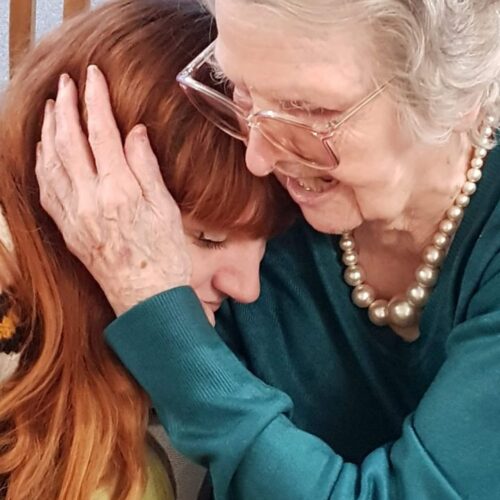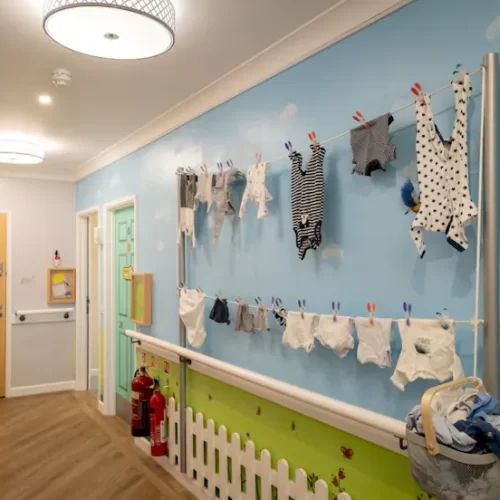Are You Looking For A Care Home or Nursing Home? Fill out the call back form below and we will be in touch
Person-centred Dementia Care In Poole and Bournemouth
All our care homes specialise in providing high-quality dementia care in Poole and Bournemouth.
While the term “dementia” is used to describe a range of symptoms caused by specific brain conditions, they vary from person to person.
This is why we believe that dementia care is about more than looking at the condition’s symptoms. It’s about getting to know the person – their history, interests, skills, and personality – and customising their care plan to best suit them.
Discover more about our dementia services by booking a visit to our homes and seeing how our facilities are adapted to make everyday life easier for your loved one.

Our Approach to Dementia Care in Poole and Bournemouth
Our approach to providing care centres around each person’s unique life story. By getting to know their likes, dislikes, biographies, and lifestyle, we can create a tailored care plan that respects their identity and dignity, even as dementia progresses.
By understanding the person and not just the symptoms, we can provide meaningful activities and daily life experiences tailored to the individual to enhance their quality of life.
Speak to our team to learn more about our approach to dementia care or visit one of our homes to see what life is like for our residents. Call us on 01202 037373 or complete our online enquiry form.
Our Facilities
As specialists in dementia care in Poole and Bournemouth, we have adapted the facilities at each of our homes to make every day a little bit easier for your loved one.
Our home’s design includes:
- Simple and easy-to-navigate building layout
- Bright colours
- Clear signage
- Visual cues
- Sensory reminders
We monitor all of our communal areas, including corridors, to ensure that everyone is safe and happy.
We also adapt rooms:
- Encouraging residents to bring in their favourite furniture
- Putting up personal images and photos
- Adding their name and picture to their doors
- Painting their door a bright colour so it is easily recognised
- Painting their room walls a colour of their choice
Additionally, we adapt all of our activities to the resident’s abilities and incorporate dementia-focused tasks into our programme.


What is the Behaviour Staging Model?
At LuxuryCare, we follow the ‘behavioural staging’ model of dementia care.
Dementia is a progressive condition, so it’s important that we have reference points to track changes over time. Behavioural staging provides a shorthand way of describing a person’s current needs and abilities within the larger context of their disease progression.
This approach also acknowledges the individuality of how each person experiences and reacts to their illness.
Like with any other illness, dementia can be described as having a beginning, middle, and end. By using behavioural staging, we can identify each stage of the disease and tailor our care strategies accordingly to help our residents live as full and enriched lives as possible.
Get in touch with our team to discuss how your loved one might benefit from this approach. Call us on 01202 037373.
The Stages of Dementia
Behavioural staging allows us to anticipate the changes in symptoms and behaviours as your loved one’s dementia progresses. By understanding these changes, we can differentiate between symptoms that are related to dementia and those that may be due to general ill health or ageing.
Disorientation and Mild Confusion
- Keeping up a good social facade to hide short-term memory losses and appear oriented.
- Reduced attention span.
- Aware of memory mistakes, may try to hide them.
- Fearful of losing control, independence, and becoming “crazy”.
- May exaggerate independence to mask their own fears.
- May be frightened by the confusion of others.
- Difficulty finding some words and following conversations.
- May experience anger, defensiveness, blame, tension, and anxiety.
Time Confusion and Moderate Confusion
- Visibly disorientated with a loss of sense of chronological time, and not always aware of the season or time of day. May believe deceased persons, such as parents, are still alive.
- Becoming disinhibited, losing a sense of social etiquette, and starting to say what they are thinking.
- Language becomes more obviously affected, with the loss of the ‘thread’ of a sentence and the invention of new words to substitute for lost ones.
- Attention span is very limited, with an increased tendency to misplace things.
- Individuals may be less aware of their memory deficits and “mistakes,” leading to a more relaxed state and retreating to memories of happier times.
Repetitive Motion and Severe Confusion
- Verbal ability is limited, use of shorter phrases is common, or sometimes just whistling or singing.
- Efforts to initiate verbal contact are minimal.
- Severe sensory deficits, especially visual, are apparent.
- May engage in repeated movements, such as rocking, tapping, patting, polishing, or rolling up their dress.
- They often sit or lie down for much of the day.
- Individuals may recognise family members as familiar, but usually cannot retrieve their names or their relationship to them.
Calm End Stage Withdrawal
- Appears to sleep for most of the day
- Minimal body movements, muscles are loose
- Can’t recognise family members
- Withdrawn from the outside world most of the time
- Still able to respond to loud noises and unusual stimuli, such as music, a friendly voice, favourite foods, or a massage.
Visit One of Our Dementia Care Homes
If you’d like to know more about our dementia care in Poole and Bournemouth, visit one of our dementia care homes, where you will be able to chat with our friendly staff and see what life is like for our residents. Book your visit online or call us on 01202 292796. We’re happy to answer your questions and explain our specific methods in more detail, so don’t hesitate to reach out today!




























